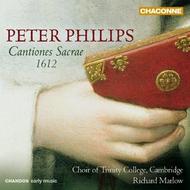
Philips - Cantiones Sacrae 1612
£14.49
In stock - available for despatch within 1 working day
Despatch Information
This despatch estimate is based on information from both our own stock and the UK supplier's stock.
If ordering multiple items, we will aim to send everything together so the longest despatch estimate will apply to the complete order.
If you would rather receive certain items more quickly, please place them on a separate order.
If any unexpected delays occur, we will keep you informed of progress via email and not allow other items on the order to be held up.
If you would prefer to receive everything together regardless of any delay, please let us know via email.
Pre-orders will be despatched as close as possible to the release date.
Label: Chandos - Chaconne
Cat No: CHAN0770
Format: CD
Number of Discs: 1
Genre: Vocal/Choral
Release Date: 1st June 2010
Contents
Artists
Choir of Trinity College, CambridgeConductor
Richard MarlowAbout
Born in 1560 or 1561, he trained as a choirboy at St Paul’s Cathedral in London and may have studied keyboard playing with Byrd. In 1582 he fled England to avoid persecution as a Roman Catholic, making his way to Rome. In 1585 he joined the entourage of another Roman Catholic refugee, Sir Thomas Paget, travelling with him through Northern Europe for the next five years, eventually settling in Antwerp in 1591. In 1593 he was accused of plotting against Elizabeth I and arrested, but was eventually exonerated. He joined the court chapel of Archduke Albert, Viceroy of The Netherlands, as organist in 1597 and remained there until his death in 1628.
The three years spent in Rome were crucial for the formation of Philips’s musical style. The early 1580s were years of rapid development in that city’s music, particularly in writing for multiple choirs. Philips wrote some double-choir music and the antiphonal principle underlies much of the music on this recording, even if written for a single choir of five voices: two sopranos, alto, tenor and bass – a texture that gives an overall brightness, often heightened by close spacing between the two sopranos.
Error on this page? Let us know here
Need more information on this product? Click here